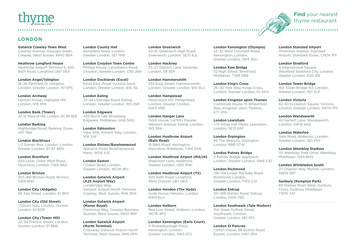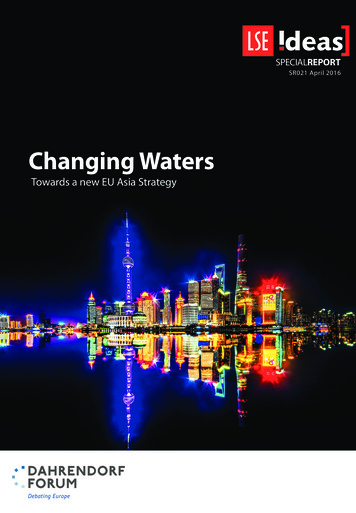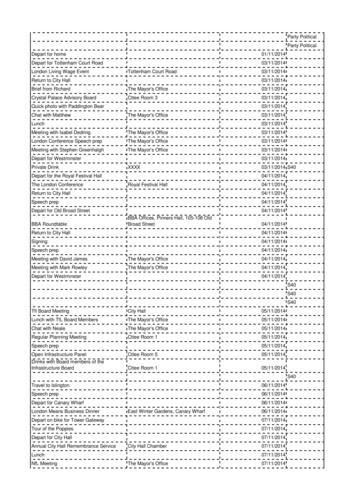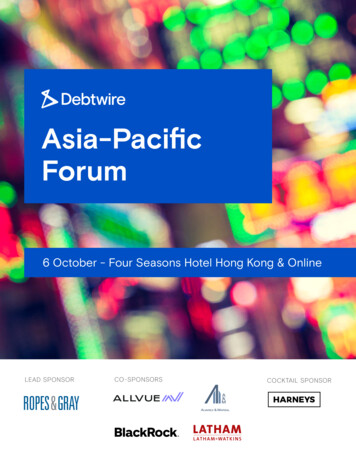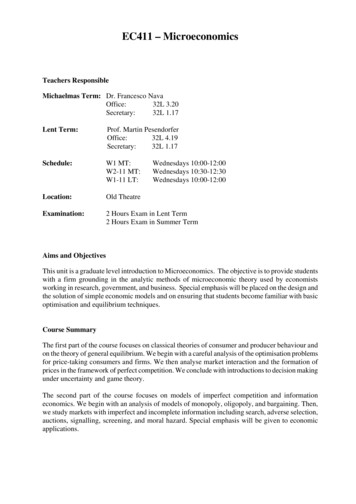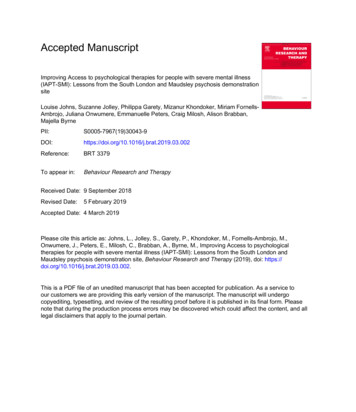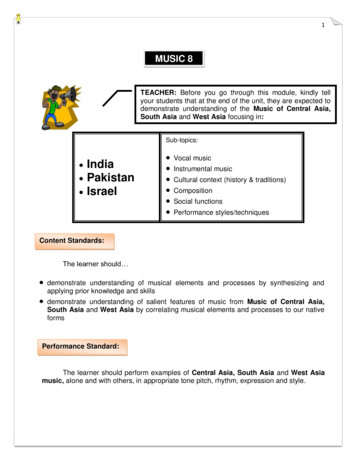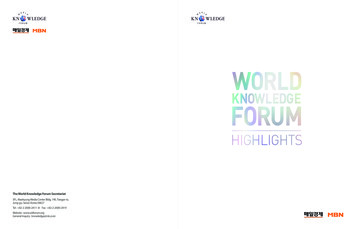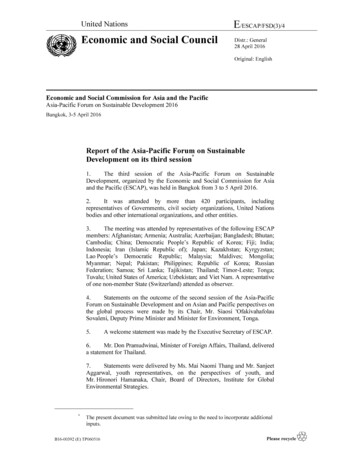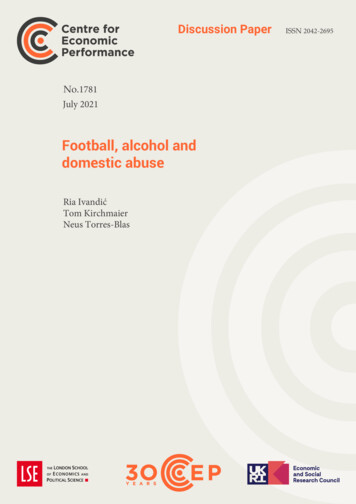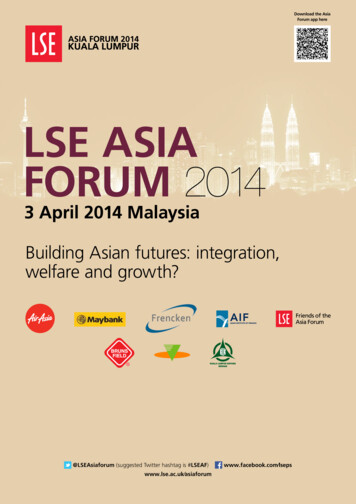
Transcription
Download the AsiaForum app here2014LSE ASIAFORUM 20143 April 2014 MalaysiaBuilding Asian futures: integration,welfare and growth?@LSEAsiaforum (suggested Twitter hashtag is ps
.Yes, it’sYOUcomplicated THANTHINK.Yes, it’s complicated thethetherelationship between biodieselYes,it’scomplicated theYes,it’scomplicated theYes,it’scomplicated ed thetheYes,it’scomplicated relationshipbetweenbiodieselYes,it’scomplicated etweenbiodieselYes,it’s andcomplicated challenges.Business,a rnSchoolofBusiness,a LSELearn more at TRIUMEMBA.ORG/LSENYU STERN LSE HEC PARISNYU STERN LSE HEC PARISEUR 33 1 39 67 70 94TRIUMEMBA.ORG/LSEINFO@TRIUMEMBA.ORGNYUSTERN LSE HECPARISNYUSTERN LSE HECPARIS 11212USA 339980442NYUSTERN LSE HECPARISNYUSTERN LSE HECPARISNYUSTERN LSE HECPARISEUR39677094EUR 33 1 39 67 70 /LSEINFO@TRIUMEMBA.ORG 11 212USA9980442 USA2129980442EUR33139677094NYUSTERN LSE HECPARIS EUR33139677094 EUR33139677094 EUR 133EUREUR33396770941 39676770709494TRIUMEMBA.ORG/LSEINFO@TRIUMEMBA.ORG ORG/LSEINFO@TRIUMEMBA.ORG SEINFO@TRIUMEMBA.ORGUSA 1 212 998 0442199821299804421 2122129980442 USA USAUSA USA1USA21299804421 212044219980442 EUR 1 33 1 39 67 70 94Trium Soy LSEmag F4C081011.inddUSA 1 212 998 0442um Soy LSEmag F4C081011.indd 1ium Soy LSEmag F4C081011.indd 1Trium Soy LSEmag F4C081011.indd1Trium Soy LSEmag F4C081011.indd1Trium Soy LSEmag F4C081011.inddoy LSEmag F4C081011.indd1Trium Soy LSEmag F4C081011.indd1 11Trium Soy LSEmag FO@TRIUMEMBA.ORGINFO@TRIUMEMBA.ORG8/10/11 2:33 P8/10/118/10/11 2:332:33PMPM8/10/112:338/10/118/10/112:38/10/11 8/10/112:33PM2:332:33PM8/10/11
Contents and SponsorsAt a glanceAbout LSE2LSE and Malaysia2Welcome Letter from Professor Craig Calhoun307:30 – 08:45:RegistrationRationale408:55 – 09:10:Welcome and introductionProgramme5Programme Synopses609:10 – 09:30: Keynote address from His Excellency Dato’Sri Mohd Najib bin Tun Haji Abdul Razak,prime minister of MalaysiaSponsor Profiles8Thursday 3 AprilSpeaker Biographies1009:30 – 10:50: Plenary Session 1: Internationaland regional relations in AsiaCongratulations to our Graduating Students1711:15 – 12:35: Plenary Session 2: Cities and urbanisationLSE and Asia1812:35 – 14:00:LSE’s Alumni Association21 Networking lunch: LeveragingAsia’s success14:00 – 15:20:Alumni Groups in Asia22 Plenary Session 3: ASEAN leadershipin a leaderless worldSupporting LSE2315:40 – 17:00:Public lectures and events25 lenary Session 4: Finance – internationalPmonetary regimes17:00 – 17:30:Closing remarksWith special thanks to our sponsorsAsia Forum 2014 Malaysia 1
About LSEThe London School of Economics and PoliticalScience – LSE is a specialist university withan international intake and a global reach.Its research and teaching span the full breadthof the social sciences, from economics, politicsand law to sociology, anthropology, accountingand finance.Founded in 1895 by Beatrice and Sidney Webb, the Schoolhas an outstanding reputation for academic excellence.16 Nobel prize winners have been LSE staff or alumni. Thefirst was George Bernard Shaw, one of the founders of LSE,who was awarded the Nobel Prize for literature in 1925. Themost recent was Sir Christopher Pissarides, Regius Professorof Economics at LSE, who was awarded the Nobel Prize forEconomics in 2010 who is with us today at the Asia Forum.In total, 34 past or present world leaders have studied ortaught at LSE.Many influential developments in thinking about society,economics and politics have originated in work carried out atthe School, including the basis of the modern welfare state andthe development of free-market economics. From its foundationover a hundred years ago LSE has aimed to be a laboratory ofthe social sciences, a place where ideas are developed, analysed,evaluated and disseminated around the world.LSE is the only university in the UK specialising in the studyof the social sciences, and has a worldwide reputation in thefield. In the most recent Research Assessment Exercise theSchool had the highest percentage of world leading researchof any university in the country. LSE’s academic departmentshave also achieved outstanding results in the HEFCE/QAAteaching quality assessment/subject review exercises; anda range of independent and authoritative assessmentshave judged the School to be among the world’s leadinginstitutions for study of the social sciences.The School’s international reputation and London locationensure that in times of crisis it is often to LSE that the mediaturn first for a response. Nicholas Stern (climate change),Conor Gearty (human rights), Tim Newburn (crime), AnnePower (housing policy), Tony Travers (London and localgovernment) and Danny Quah (the weightless economy)will all be familiar names to the average news addict. Tofurther strengthen LSE’s academic excellence the Schoolhas embarked on one of the biggest recruitment drives inits history, with over 80 leading social scientists joining theSchool since September 2012.LSE and MalaysiaLSE has a longstanding relationship with Malaysiaand has Malaysian alumni dating back to the1950s. Around 290 students a year from Malaysiacome to study at LSE and there are now over1,500 LSE alumni living in Malaysia.The LSE Alumni Group in Malaysia was founded in 1985and is one of the largest alumni groups in Asia. The alumnigroup organises a range of intellectual, social, networkingand professional development activities in Kuala Lumpur inwhich alumni can participate. The group has hosted lectures2 Asia Forum 2014 Malaysiaand panel discussion events with LSE’s academics includingProfessor Danny Quah and Dr Razeen Sally, former lecturerin International Relations. LSE’s alumni in Malaysia cover awide range of roles in academia, business, civil society andgovernment. LSE enjoys loyal support from its alumni inMalaysia and the group gave generously during the School’s lastfundraising campaign for its flagship New Academic Buildingin Lincoln’s Inn Fields and more recently we have receiveddonations from Malaysian alumni towards 32 Lincoln’s InnFields, the School’s new home for Economics.
Welcome Letter from Professor Craig CalhounWelcome to the 6th LSE AsiaForum! We are delighted tobe in Malaysia and to host thisimportant event. This marksten years of LSE Asia Forums.Each has been an excitingintellectual event, and eachhas strengthened ties to Asia.The Forum addresses key issues by mobilising leading researchersand experts from LSE together with outstanding Asianspecialists. We have some of our leading academics heading upthe sessions today and some very high profile respondents fromthe worlds of business, policy making and civil society, so we arelooking forward to lots of thought-provoking debate ahead.This year sees the introduction of the LSE Asia Forum event app.I know many of you are already using this but for those who arenot, please do download the app; we will be sending out pushnotifications throughout the day and it is a great opportunity toconnect with your fellow delegates. You also have the chance towin a place at tonight’s exclusive Speakers’ Dinner!Please also remember we have a twitter hashtag, so if you wouldprefer to ask a question to our speakers today via twitter, or tolink this event to the world, you can use the hashtag #LSEAF.Lastly I would like to say congratulations to those studentswho graduated yesterday in our first ever Malaysiangraduation ceremony. We look forward to seeing many of youat our future alumni events and wish you the best for yourforthcoming careers.I hope that you enjoy the LSE Asia Forum and I would like tothank the Malaysian Alumni Group for their support on thiskey event.Craig CalhounLSE Director and PresidentYou can download the Asia Forum app from your mobiledevice at the following link: https://crowd.cc/s/1O1KAlternatively search “Asia Forum” on the iTunes store orGoogle Play.Asia Forum 2014 Malaysia 3
RationaleThe LSE Asia Forum is an important and verypublic part of the School’s strategy to enhanceits long standing relationship with the rapidlydeveloping Asian region. LSE has historicallyattracted many very talented students andstaff from all major Asian countries. The Schoolhas a large and distinguished group of alumniin the region and has been active in buildingpartnerships with business and governmentsfor many years. The LSE Asia Forum is aunique opportunity to bring together LSE’skey partners in the region. The Forum providesan opportunity for analysis of differentperspectives on the economic, social, politicaland cultural contributions Asia is making toglobal development.LSE is delighted to host the 6th LSE Asia Forum in KualaLumpur, Malaysia on 2 and 3 April 2014. The Asia Forumkeynote speech will be delivered by His Excellency Dato’Sri Mohd Najib bin Tun Haji Abdul Razak, primeminister of Malaysia.4 Asia Forum 2014 MalaysiaThe theme of this year’s Forum is Building Asian futures:integration, welfare and growth? The day will be divided intofour plenary sessions each led by an LSE academic, with achairperson and commentators from the world of business,government, and policy making. This year’s sessions include: International and regional relations in Asia led byArne Westad, director of LSE IDEAS and professor ofinternational history. Cities and urbanisation led by Ricky Burdett, director ofLSE Cities and the Urban Age programme and professor ofurban studies. A SEAN leadership in a leaderless world led by DannyQuah, professor of economics and international development,and Kuwait Professor at LSE. F inance – international monetary regimes led by CharlesGoodhart, emeritus professor of banking and finance anddirector of the Financial Markets Group Programme at LSE.Professor Tim Besley will also give a lunchtime speech entitledLeveraging Asia’s success and we will also hear from NobelLaureate Sir Christopher Pissarides and LSE Director andPresident, Professor Craig Calhoun.
ProgrammeThursday 3 April 201407:30 – 08:45Networking breakfast and registration08:55 – 09:10 elcome and introduction by LSE DirectorWand President, Professor Craig Calhoun09:10 – 09:30 Keynote speech by His Excellency Dato’Sri Mohd Najib bin Tun Haji Abdul Razak,prime minister of Malaysia09:30 – 10:50 Plenary Session 1: International andregional relations in Asia led by ArneWestad, professor of international historyand director of LSE IDEAS Chair: Dr Munir Majid, visiting senior fellowat LSE IDEAS, former chairman of MalaysianAirlines, chairman of Bank MuamalatMalaysia and chairman of CIMB ASEANResearch Institute Respondent 1: Tao Wenzhao, seniorresearch fellow, Institute of AmericanStudies, Chinese Academy of Social Sciences Respondent 2: Dr Hassan Wirajuda, formerIndonesian foreign ministerQ&A session10:50 – 11:15Networking coffee break11:15 – 12:35 Plenary Session 2: Cities andurbanisation led by Ricky Burdett,professor of urban studies, director of LSECities and the Urban Age programme Chair: Datuk Syed MohamedIbrahim, president and CEO,Iskandar Investment, Malaysia Respondent: Mike Douglass, professorin the Asian Urbanisms Cluster, AsiaResearch Institute, National Universityof Singapore (NUS)Q&A session12:35 – 14:00L unch: Leveraging Asia’s successpresented by Tim Besley, School Professorof Economics and Political Science, LSE14:00 – 15:20 lenary Session 3: ASEAN leadershipPin a leaderless world led by Danny Quah,professor of economics and internationaldevelopment and Kuwait Professor, LSE Chair: Arne Westad, professor ofinternational history and director ofLSE IDEAS Respondent 1: Azman Mokhtar,managing director, Khazanah NasionalBerhad, Malaysia Respondent 2: Kishore Mahbubani, formerpresident of United Nations Security Counciland professor in the practice of public policyand dean of the Lee Kuan Yew Schoolof Public Policy, National University ofSingapore (NUS)15:20 – 15:40Networking coffee break15:40 – 17:00 lenary Session 4: FinanceP– international monetary regimes ledby Charles Goodhart, emeritus professor ofbanking and finance and FMG programmedirector, LSE Chair: Jaseem Ahmed, secretary-general,Islamic Financial Services Board Respondent 1: Andrew Sheng, president,Fung Global Institute, and chief adviser tothe China Banking Regulatory Commission Respondent 2: Rajat Nag, formermanaging director general, AsianDevelopment BankQ&A session17:00 – 17:25 losing remarks from the perspective ofCNobel Laureate Sir Christopher Pissarides,Regius Professor of Economics, LSE17:25 – 17:30 losing remarks by Director and President,CProfessor Craig CalhounDo remember to check-in to each session on the AsiaForum app for your chance to win a place at the exclusiveSpeakers’ Dinner.Asia Forum 2014 Malaysia 5
Programme SynopsesPlenary Session 1: Internationaland regional relations in AsiaLunch Session: Leveraging Asia’s successled by Professor Arne WestadWhat are the portable lessons from Asia’s economic successfor other places around the world (particularly Africa andthe Middle-East)? This short lunch time session will discuss,in particular, the institutional underpinnings of successfuleconomies and the debates about the value of democraticinstitutions to economic performance. We will also look atsome of the differences across Asian economies and themixed fortunes of some regions within countries.Over the past decade Asia has moved into the spotlight ofinternational relations. Today’s security experts are morepreoccupied with developments within this region than theyare with any other part of the world. The massive shift inwealth and power from West to East has contributed to thispreoccupation. But so has the many points of confrontationwithin the Asian region itself: On the Korean peninsula;between China and Japan; between China and some ASEANcountries; or between India and its neighbours.This session will explore the contradictory development ofinternational relations in Asia, with a special focus on theSoutheast Asian region. Among the key questions are: Whatare they key challenges to ASEAN? How will the relationshipbetween China and Southeast Asia develop in the future? Whatis the future role of the United States in Asia? And how willon-going conflicts in other parts of Asia – Korea, China-Japan,India-Pakistan – influence developments in Southeast Asia?Plenary Session 2: Cities and urbanisationled by Professor Ricky BurdettBy 2050, 75 per cent of the world’s population will be livingin cities with billions of urban dwellers living in the growingeconomies of the Global South. While cities provide jobs,security and potential they also create challenges in terms ofthe environment and social inclusion. One out of every threenew urban residents will live in slums without access to basicinfrastructure and three quarters of the global CO2 emissionswill come from cities.The megacities session at LSE Asia Forum will explorethese themes in the context of major urban developmentin the Global South. City-leaders and urban specialistsfrom Malaysia and the wider region will outline the majorproblems – pollution, congestion, exclusion – that face citiestoday and explore how urban environments can be planned,managed and governed to be more socially, economically andenvironmentally sustainable.led by Professor Tim BesleyPlenary Session 3: ASEAN leadershipin a leaderless worldled by Professor Danny QuahThe 2008 global financial crisis, the subsequent anemicrecovery across many of the world’s economies, anddisorganised policy responses worldwide are only amongthe most recent indicators of what some are calling a deepongoing failure in world leadership: a gridlock in globalgovernance. The global economy’s traditional leaders havegone missing in action, and no replacement has been found.Instead, on the world stage, political leaders pay mind evermore only to short-term national interests, and overlookhow their actions might inadvertently destabilise the globaleconomy. Paradoxically, however, just looking out for one’sself-interests could ultimately be self-defeating.In microcosm, the ASEAN region today faces these samechallenges of cooperation and leadership, as ASEAN seeksever greater consolidation towards an ASEAN EconomicCommunity by 2015. ASEAN’s concerns might be regionalrather than global, but the problems are identical to thosefaced by a world economy that is uncoordinated andleaderless. The danger, at all levels, is that the benefits toregional economic integration and cooperation might besacrificed on the altar of national expediency, as memberstates attempt to engage with domestic populationsshowing ever greater political clout, ever more visible politicaldissatisfaction, and ever greater sensitivity to the benefits ofeconomic growth needing to be distributed equitably.As ASEAN continues to build a regionally-integrated economy,what lessons can ASEAN offer for how the world’s economicleadership might be usefully restructured? Conversely, whatare the lessons from world or indeed European economiccooperation for how ASEAN’s political leadership might guidecollaborative economic success? In this last century, has world6 Asia Forum 2014 Malaysia
economic leadership succeeded only because of the vision andthe power of (benevolent) US hegemony? If the age of Americanunipolarity has passed and the centre of the world economy soonwill be Asian, what does Asia need to build that it might helpguide global leadership? How does this centre avoid being only abattleground for great-power competition? And, perhaps mostcritical, how do these proposals for regional and global leadershipbenefit the ordinary people in Asia?Plenary Session 4: Finance – internationalmonetary regimesled by Professor Charles GoodhartThis year is the 70th anniversary of the 1944 Bretton WoodsConference, which established the IMF and the post-warinternational monetary regime. Although parts of that initial regimehave disappeared, eg, the pegged, but adjustable, exchange ratesystem, much remains. There remain two main weaknesses.First it is based on a single hegemonic currency, the US dollar.US policy is, of course, related solely to national US interests.When such a hegemon is a net creditor (as with Germany in theEurozone), such a system can have a deflationary bias, and viceversa when the hegemon is a net debtor.Second, the Bretton Wood system is asymmetric. Debtorshave to adjust. Creditors do not. The IMF has no grip on largecreditor countries.But net creditor account surpluses imply net capital outflows.The realised yields on such foreign investment has often beendisappointing, (Germany/China). Can policy makers help to restorebalance by targeting (short-term) capital flows, rather than by tryingto pressurise surplus countries to expand? The climate of ideas ischanging. It could be done by macro-prudential instruments, eg,changing RWAs. But needs more thought.Finally, the pattern of current account imbalances may be about tochange, (Japan has already swung around). China, Germany andoil producers have been in surplus, with USA as the main deficitcountry. But two main factors:1 Energy2 Demography.may change all that. In future (after 2020) the North (in Asia, Europeand North America) will be aging and moving into current accountdeficit. In contrast the South (Asia, Africa and South America) willbe growing more rapidly and in current account surplus.Where does that leave Malaysia?Asia Forum 2014 Malaysia 7
Sponsor ProfilesDiamond Event SponsorThe Frencken Group are a DiamondEvent Sponsor for the LSE AsiaForum 2014.Frencken Group Limited (“Frencken”) is a global high-techcapital and consumer equipment service provider. The Group,formerly known as ElectroTech Investments Limited, is a publiccorporation listed on the Mainboard of the Singapore Exchangesince May 2005.frenckengroup.comGold Event SponsorThe Asian Institute of Finance, a jointinitiative by Central Bank of Malaysiaand the Securities CommissionMalaysia was established to enhance human capitaldevelopment in the financial services industry across Asia.Committed to lead capacity building and standards settingfor the financial services industry, the Institute offers thoughtleadership and applied industry focused research in key areas oftalent management, financial inclusion, ethics and strategic risk.Working in partnership with Institute Bank-Bank Malaysia,Islamic Banking and Finance Institute Malaysia, MalaysianInsurance Institute and Securities Industry DevelopmentCorporation, the Asian Institute of Finance coordinates andenhances programme content and delivery for the financialservices industry both domestically and regionally.aif.org.myGold Event SponsorThe Maybank Group offersa comprehensive range offinancial services ranging from corporate and consumerbanking, investment banking, insurance and takaful, assetmanagement, Islamic banking, offshore banking, stock broking,venture capital financing and internet banking.It operates an extensive global network of over 2,200 officesin 20 countries including in all 10 ASEAN countries. From itskey home markets of Malaysia, Singapore and Indonesia, theGroup’s presence extends to the Philippines, Brunei Darussalam,Cambodia, Vietnam, Laos, Thailand, Myanmar, China, HongKong, Papua New Guinea, Pakistan, India, Uzbekistan, SaudiArabia, Bahrain, United Kingdom and United States of America.The Maybank Group has leveraged its vast network andextensive experience of over 53 years to bridge customersacross the world through unique financial solutions andadvisory services that are tailored for their specific needs. Itsvast array of products and capabilities makes the Group an idealbusiness partner, particularly in markets where it has a presence.8 Asia Forum 2014 MalaysiaWith a strong focus on innovation and excellence, Maybankhas been consistently recognised for its leadership and abilityto deliver value to all its stakeholders. It has received numerousregion and international awards, and acknowledged for itsleadership among peers. Maybank is ranked among the top 20Strongest Banks in the World by Bloomberg Markets magazine,and is the leading Malaysian bank and among the top 100Global Banks listed by The Banker magazine. It has also beenranked Malaysia’s Most Valuable Brand for a number of years.The Group’s Islamic Banking arm, Maybank Islamic Berhad, isthe top Islamic commercial bank by assets in the Asia Pacific and3rd in the world.Maybank Group was built on the commitment that it wouldserve as a catalyst for economic and social developmentwherever it operates. True to this philosophy, the Grouphas continuously worked to support economic and socialdevelopment in countries where it operates. Today, this isreinforced by its mission to humanise financial services acrossAsia. Through this mission, Maybank is focused on providingpeople with access to financial services at fair terms and pricing,advising them based on their needs and being at the heart ofthe community.The Maybank Foundation remains an integral avenue forthe Group to reinforce its commitment to the community.Through the Foundation’s regional corporate responsibilityinitiatives as well as the active involvement of its employees,Maybank remains steadfast in helping foster a better and moresustainable future for all.www.maybank.comGala Dinner SponsorThe VXL Group was established byDatuk Lim Chee Wah, a former DeputyManaging Director of Genting Berhad,which is a conglomerate listed company in Malaysia withbusinesses in gaming, hospitality, power, oil and gas. TheVXL Group is a diversified investment group with a portfolioprimarily focused on the emerging markets in Asia.With its corporate office located in Kuala Lumpur, Malaysia,the Group has a pool of experienced, talented managementand support staff to execute and monitor various investmentsspanning across the region. The Group has, over the years,gained a strong foothold in the rapidly developing economiessuch as China, Vietnam and Cambodia. Leveraging on theback of economic growth, real estate values and opportunitiesemerge in this region.The VXL Group has made high yield investments in builtup properties and property development projects in serviceapartments, hotels, retail and commercial buildings in strategiclocations. In Cambodia and Vietnam, the Group is embarking
on a long term development project specialises in gaming,leisure and hospitality. The investment is made to tap into thegrowing population of the two big emerging markets in SouthEast Asia. In Malaysia, the home country of Datuk Lim CheeWah, the Group has ventured into information technologybusiness, which is in line with the promotion of knowledgeeconomy and educated pool of resources in the country.vxlgroup.comSpeakers’ Dinner SponsorThe Brunsfield International Group is apremier global property development –construction – real estate managementcompany that delivers quality lifestyles in itshighly sustainable signature developmentprojects. It is recognized as a progressive and innovative industryplayer with a portfolio of catalyst buildings and sustainabletownship development projects. The Group’s expertise inoperating an integrated global value chain has enabled it tocontinue to deliver the highest quality development projectsthat can compete with the best in the world.The Brunsfield International Group is dedicated to the conceptof integrated prosperity to help us deliver the ultimate bestvalue in all our signature developments, and be a strategicpartner in promoting sustainable development. Workingeffectively in a highly collaborative environment, we arenurturing new capabilities for the future, with a consistent focuson delivering real value-added services and solutions to ensurethe sustainable success of our customers and stakeholders.The Group’s rubber plantations yield a steady annual productionof premium SIR/SMR grades and latex concentrate, meetingwith the MS I
TRIUM Global Executive MBA, a world-class alliance among NYU Stern School of Business, the London School of Economics and HEC Paris,prepares senior- level executives to transform complex business challenges into global business opportunities. Learn more at TRIUMEMBA.ORG/LSE NYU STERN LSE HEC PARIS TRIUMEMBA.ORG/LSE EUR 33 1 39 67 70 94
